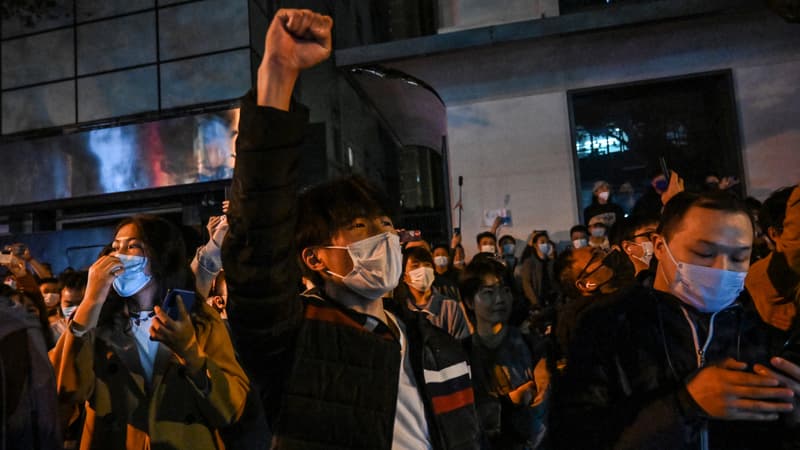For more than a week, protests have been taking place in China against the “zero covid” policy, in force since the start of the pandemic, which has subjected the population to repeated controls and strict confinement. Such a widespread uprising is extremely rare in China, given the crackdown on any form of opposition to the government.
Beijing has also cracked down on demonstrations by arresting participants and blocking corridors used, but also searching for protesters. Some, who protested on Sunday in Beijing against health restrictions but also in favor of more freedoms, were for example contacted by phone by the police who questioned them about their presence at the demonstration, one of them told AFP.
Therefore, the question arises as to how the police managed to discover the identity of certain protesters, when the vast majority of them did not have their identity documents verified during the demonstration on Sunday.
Find protesters by phone
The US outlet CNN had access to a recording between a protester and a police officer, confirming that the Chinese authorities are using mobile phone data to locate the protesters.
The policeman asks the protester by phone if he was on Sunday at the Liangma River, a place in Beijing where demonstrations against the restrictions were held. The person denies being there, to which the police respond, “so why did his cell phone number show up there?” In China, mobile phone users must register their real name and national identification number, explains CNN.
A protester told AFP late Monday that she and five of her comrades who also demonstrated in the capital on Sunday had received a call from Beijing police.
The policeman “said my name and asked me if I had been to the Liangma River last night… He specifically asked me how many people were there, what time I was there, how I heard about it,” the protester said. who requested anonymity for security reasons.
“The police pointed out that the protest last night was illegal and asked if we had any demands that we would like to communicate to them through legal channels,” he added.
Prevent content from being shared on social media
Protesters also try to protest on social networks, despite the significant censorship exercised by the Chinese authorities, which, for example, have removed keywords linked to the demonstrations and prohibited the use of certain applications.
In Shanghai, an AFP journalist who witnessed several arrests discovered that police forcibly searched a protester’s phone for foreign social media apps, blocked in China, that some use to spread information messages about events.
The Chinese government has also tried to stifle online searches on some platforms, using the keywords used to send many other non-protest-related messages, such as pornography.
“You had a lot of messages that led you to pornographic or escort sites, the idea was to bury and push the messages” from the protesters, explains on our antenna Véronique Reille-Soult, opinion specialist, social networks and president of Backbone. Consultant.
chinese news site China Digital TimesHe published government notes showing his fear that the population will evade the current censorship, asking to strengthen the management of published content.
How people circumvent censorship
On Chinese social networks and encrypted apps, inaccessible in China without specialized software, protesters share advice, including legal ones, on what to do in case of arrest or questioning by police.
“They try to go through platforms that are a little less controlled by the authorities. We have Telegram and Twitter, for example, which have had a resurgence of interest. It is a way for them not only to share images (…) but also to know and make fun of censorship”, says Véronique Reille-Soult.
To keep posting content on social media, the Chinese use various techniques such as filters on videos, adding music that has nothing to do with the protest, or taking videos of videos, such as explains a New York journalist on Twitter.
With videos “when the algorithm will analyze the content of the video, it will inspect each pixel and try to associate it with something it already knows,” he explains to 20 minutes Victor Louis Pouchet, BZhunt hacker. Filters or other added acts act as parasites in the recognition tool, which can then lose the real meaning of the published images.
They also use “key words that you don’t expect, for example you have the word ‘banana peel’ which is used a lot, because in Chinese they are the same initials as Xi Jinping, or ‘shrimp moss’, because it sounds like the word ‘resign’ “, says also Véronique Reille-Soult.
Following mass protests, several Chinese cities this week relaxed existing draconian anti-Covid rules, with President Xi Jinping arguing that the less deadly Omicron variant of the virus allows for “more than flexibility.” The protests in recent days are due to the fact that “people were frustrated” after three years of the epidemic, Xi Jinping also explained.
Source: BFM TV


